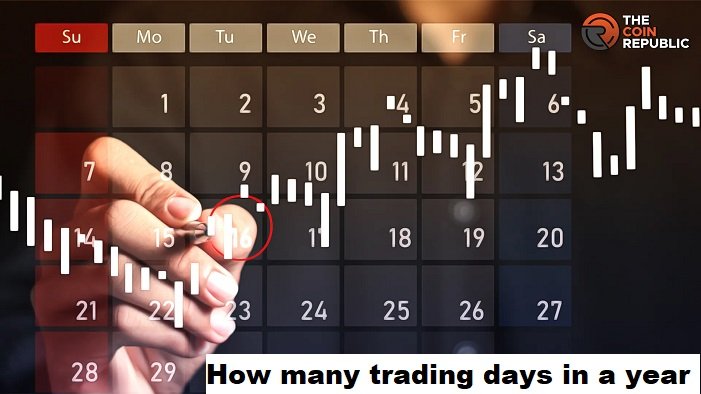How Many Trading Days in a Year? Your Guide to Market Openings and Closures

Imagine you’re a stock market enthusiast, eager to jump into the daily dance of buying and selling. But wait! There’s a crucial piece of information you need before diving in: how many trading days are in a year?
Understanding the number of trading days is essential for any investor. It helps you plan your trades, track market performance, and set realistic goals. But here’s the thing – the answer isn’t a simple one-size-fits-all.
Not Every Day is a Trading Day: Weekends and Holidays Take a Bite
Think of a year as a giant calendar. We all know weekends (Saturdays and Sundays) are for rest. In the world of finance, these translate to non-trading days. The stock market takes a breather, and no buying or selling happens.
But weekends aren’t the only time the market goes quiet. National holidays also factor into the equation. Imagine Independence Day or Thanksgiving – these festive occasions are holidays for the stock market as well.
So, to get an accurate picture of how many trading days there are in a year, we need to subtract weekends and holidays from the total number of days.
The Magic Number: Fluctuating Around 252
On average, there are around 252 trading days in a year. This number is calculated by taking the total number of days in a year (365 for a regular year, 366 for a leap year) and subtracting weekends (roughly 104 days) and holidays (around 9-10 in the US).
However, this is just an estimate. The exact number of trading days can vary slightly from year to year depending on the specific holidays that fall on weekdays. For instance, if a holiday lands on a Monday, that’s one less trading day for investors.
Read More:
The Enigma of the Bracelet of Ethereum OSRS: A Deep Dive for Old School RuneScape Enthusiasts
Planning Your Moves: Stay on Top of the Trading Calendar
So, how can you stay informed about the exact number of trading days in a specific year? Here are your best bets:
-
Stock Exchange Websites: Major stock exchanges like the NYSE and NASDAQ publish their annual trading calendars well in advance. These calendars list all the holidays when the market will be closed.
-
Financial Websites and Apps: Many financial websites and apps offer built-in trading calendars. These tools can be a lifesaver, allowing you to check the market status for any given date with a few clicks.
-
Investment Brokers: If you work with an investment broker, they can also provide you with the latest trading calendar information.
By keeping yourself updated on the number of trading days, you can make informed investment decisions and avoid any nasty surprises when the market is closed.
Remember, the financial world moves fast, and knowledge is power. So, stay informed and make the most of every trading day!




